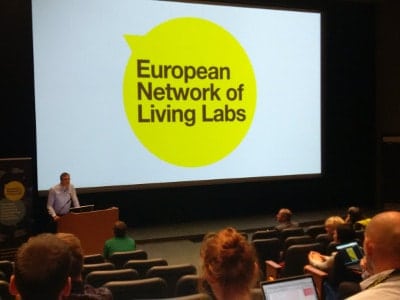
 Researchers and members of the European Network of Living Labs have descended on Montreal for their annual Living Labs Days, marking the first time they’ve held their assembly in North America.
Researchers and members of the European Network of Living Labs have descended on Montreal for their annual Living Labs Days, marking the first time they’ve held their assembly in North America.
Last year’s conference was in Istanbul.
The Open Living Labs Days assembly officially kicks off Wednesday morning, but member researchers presented papers and research on Tuesday, representing a wide array of approaches based in communities around the world.
Living Labs are basically a think-tank in action, to see how the usual methodologies applied to lab work hold up in real-life settings, applying a living labs methodology to the wild, uncontrollable aspects of how people actually use urban spaces.
If any of that sounds dry, the ambition of the conference’s presenters quickly becomes apparent.
Introducing the opening session, the Chair of ENoLL’s Scientific Steering Committee, Pieter Ballon, who is also Director of the iMinds Living Labs in Belgium, said, “We are talking about re-designing our whole physical environment.”
The Living Labs movement was founded by Veli-Pekka Niitamo, in whose name a prize for best academic paper is posthumously awarded in honour of the Finnish researcher who passed away in 2012.
There’s some overlap between Living Labs, the Smart City movement, and start-up culture in general, with the difference being that in North America the whole approach is much more business driven, with municipal or provincial government officials at least looking to formalize public-private partnerships when it comes to collecting traffic data, for example.
Start-up culture aims to bring at minimum the appearance of applying blue-sky thinking to solving real-world problems, with the underlying assumption that the actual aim is to build a highly profitable company.
Not to be stereotypical about it, but Living Labs are very European in that they’re coming from an academic research background, often led by people who feel a tension between the ability to set their own agenda and the need to satisfy the demands of their “sponsors”, a tension that was mentioned during a presentation by Dimitri Schuurman of iMind, a Belgian innovation lab.
As Schuurman points out, innovation labs are a little different from Living Labs, but that broadly speaking there’s enough overlap between their ultimate objectives to make the differences seem like quibbling.
Terms matter, though, and it’s telling that when Living Labs researchers refer to “stakeholders”, they’re talking about citizens and employees of public administrations, and rarely about corporate leadership.
Sonja Pedell of the Swinburne University of Technology in Australia discussed the role of emotion in developing innovative design ideas and problem solving regarding how older people use technology.
Struggle to remember the last time you heard someone talk about emotion in relation to technology, but thinking that way is in fact sound business practice.
Start-up and business culture might refer to it as “stickiness”, or a way of keeping “eyeballs” “engaged” with your app or device.
But if you think about any of the technology you actually enjoy, it’s your emotional reaction to it which at bottom keeps dragging you back for more.
“Many of the reasons for non-adoption stem from a lack of understanding the feelings of older adults,” said Pedell, underlining what many designers and entrepreneurs struggle to understand in their quest to solve problems like “cart abandonment” and other reasons why their “solutions” just aren’t resonating with people.
Other researchers who presented on Tuesday were from the Amsterdam University of Applied Sciences, whose Fieldlabs was established in 2013, Denmark’s Mindlab, a government-led innovation agency, a team from the University of Grenoble, in the Alps, and the Livinglab Shanghai, working out of Tongji University.
Leave a Reply
You must be logged in to post a comment.




 Share
Share Tweet
Tweet Share
Share




Comment